My Approach
“A counsellor will… help you find your own solutions – whether that’s making effective changes in your life or finding ways of coping with your problems.” — BACP, 2021
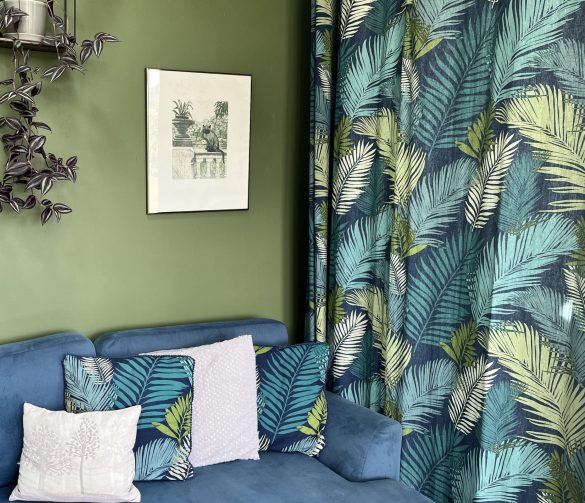
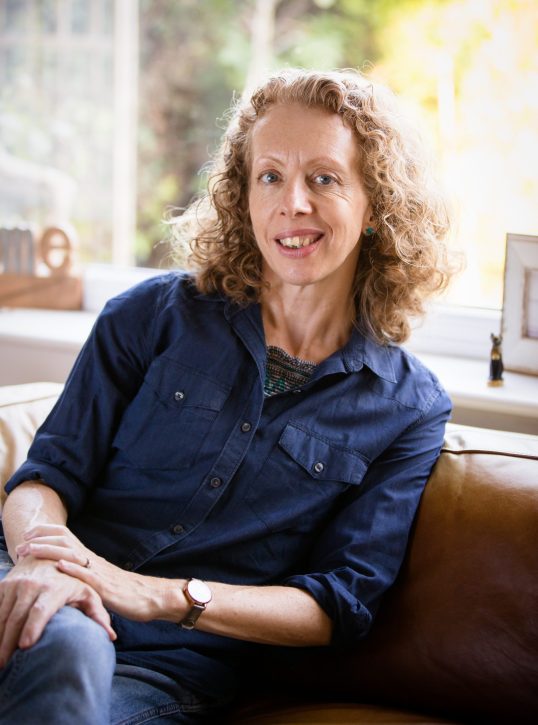
We’ll work together to make positive changes in you, your life, and your relationships.
I understand that talking about your problems to a new person can be intimidating. However, there's no 'right' way to be in our therapy sessions so just be yourself. It's you I want to get to know, the good the bad or the ugly, even your worries, tears, fears, confusion or anger. My years of training and experience as a dedicated mental health care professional mean that you're in safe hands.
My role is to support and encourage you in achieving your goals. There's no pressure to be perfect or always say the right things; simply be authentic and true to yourself. It's normal to experience a range of emotions such as anxiety, skepticism, fear, shame, anger, or doubt. Shared and explored in your sessions, these feelings can actually strengthen our bond and facilitate your growth and development.
I regularly review my practice and attend additional training to keep my theoretical knowledge and clinical skills energised and relevant while I adapt my methods to best suit your individual requirements.
How Counselling Can Help
Counselling offers a space to offload your troubles, explore your thoughts and feelings, and work toward personal growth and positive change.
Feeling heard, seen, and validated is essential for building a greater sense of safety, resilience, and confidence. In our safe, non-judgmental professional relationship, we can uncover patterns of expectations and behaviors from your past and present relationships. Through gentle curiosity and observation, we’ll work together to deepen your understanding of yourself and others.
This enhanced self-awareness can empower you to navigate difficult situations more effectively, improve communication, and foster healthier relationships. Together, we’ll uncover the insights you need to cope with challenges and thrive.
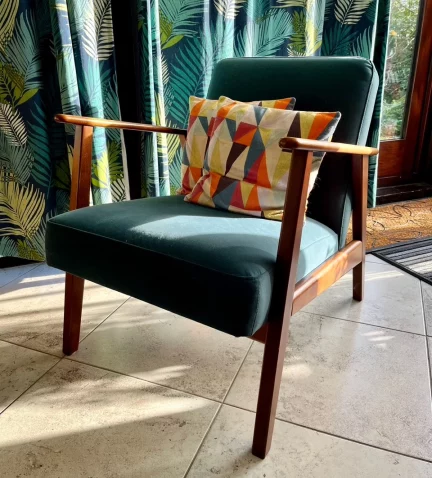
Making the Future Brighter
I have extensive experience working in private practice, Employee Assistance Programme work, schools and a city centre counselling charity with clients, from very young children to retired people, who seek counselling to connect with, express, and explore their feelings and feel better.
We can’t change what’s happened in the past, but, where appropriate, we can navigate your experiences safely to work out how they might be impacting your feelings, behaviours or relationships today. My goal is to help you make positive changes in your understanding of what’s happened, how you’re feeling and how you’re coping, so you can live a fuller, freer, happier life.
I became a counsellor because I believe in the transformative power counselling and psychotherapy and that everyone has the potential to work through problems and feel better. I have the skills, experience and training to guide that process with both professionalism and warmth.
Supporting Someone You Care About
Are you worried about a friend or family member? I’m here to help. As a partner, caregiver, or friend, it can be incredibly difficult to see someone you care about face challenges. Despite your best efforts, it might sometimes feel like you’re not making a difference. If your loved one is open to counselling, I can offer a neutral, supportive, and safe space where they can explore and understand their feelings.
I work with clients of all ages and use a variety of tools—including fidget toys, games, art materials, and colouring books—to help make communication easier and more comfortable for everyone, no matter their age or stage of life.
To ensure a safe and confidential therapeutic environment, I don’t share details about sessions with anyone. However, clients are always free to decide what, how much, and with whom they want to share about their counselling journey.
If you’d like to discuss how I might be able to support someone you care about, please don’t hesitate to contact me.
Relationship Counselling
Relationship counselling isn’t just for relationships in crisis—it can be a powerful tool for building a stronger, more fulfilling connection at any stage of your intimate partner, or partners, relationship. Whether you're facing significant challenges or want to enhance your bond and communication, counselling offers a supportive, non-judgemental space to explore together.
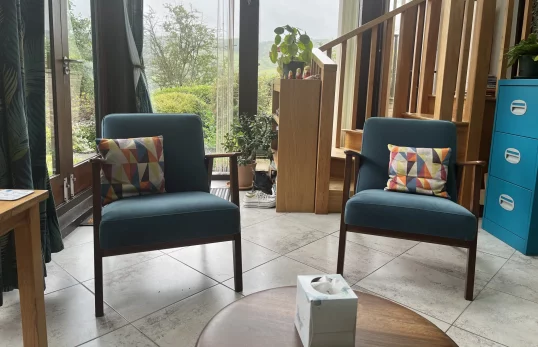
For Realtionships in Crisis
When tensions are high, communication has broken down, or trust has been damaged, it can feel overwhelming to navigate these issues alone. Counselling provides a structured and compassionate environment to work through conflict, repair hurt, and rebuild understanding. It helps people identify patterns that may be contributing to problems and develop healthier ways of relating to one another.
For Enhancing Your Relationship
Even in the absence of major difficulties, counselling can deepen your connection and strengthen the foundation of your relationships. You can improve communication, gain insight into each other’s needs and perspectives, and foster a greater sense of intimacy and teamwork. Many people find that proactive counselling helps them navigate future challenges more effectively, preventing small issues from escalating into larger conflicts.
What to Expect
Every relationship is unique, and I tailor our work to your specific needs and experiences. Whether you’re navigating a crisis or seeking to build a stronger bond, taking this step is an investment in your relationship’s health and happiness.
If you’re ready to explore how relationship counselling can support you get in touch or book a free half hour consultation by clicking the 'BOOK A FREE CONSULTATION' button at the top of the page.
In sessions, we’ll work together to:
Support for Trainee Counsellors
Training to become a therapist can be an exhilarating and challenging journey. Whether your training provider requires you complete a number of hours of personal therapy or not, the demands of balancing work, family commitments, clinical obligations, assignments, placements, and supervision can feel overwhelming. I know firsthand how tumultuous this period can be—it’s a time filled with growth, reflection, and sometimes uncertainty.
As a trainee, you’re not just learning theory; you’re also navigating your own emotional landscape, which can bring up unexpected feelings and experiences. This is where I come in. I provide calm, solid, and experienced support tailored specifically for trainees at all levels.
In our sessions, you’ll find a safe space to explore your thoughts and feelings about your training and the challenges you face. Together, we can reflect on your experiences, process any difficult emotions, and ensure you’re getting the most out of your training and personal therapy. And I truly believe that the experience of being a client will shape and inform you as a counsellor.
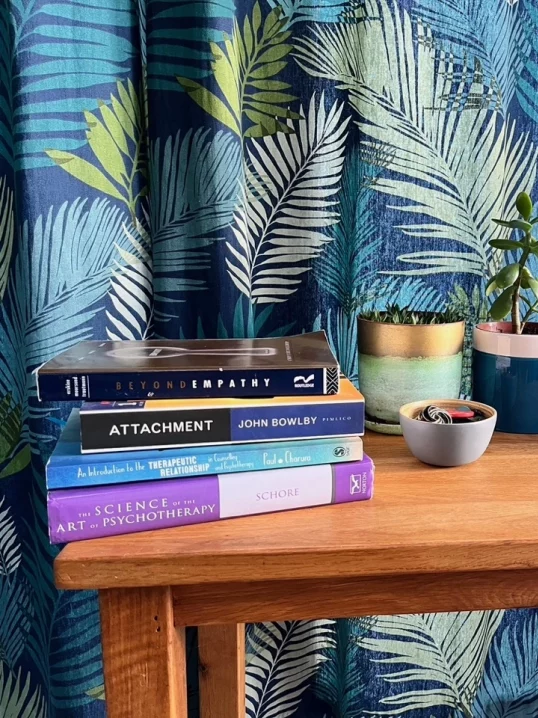
Endings
Endings hold a special significance, as they can often evoke pain or unresolved feelings from past experiences. In our work together, whether it’s short-term counselling or a longer journey spanning years, the therapeutic process offers a unique opportunity to create a meaningful and positive ending.
Unlike many other endings in life, counselling provides the space for a planned, thoughtful, and gentle conclusion. Together, we can ensure the work feels complete, with no loose threads or important words left unsaid.
Some clients choose to schedule occasional check-ins or return for additional sessions when they feel the need. This flexibility ensures support is available if and when it’s required in the future.
Get in touch
Feel free to contact me if you have any questions about how counselling works, or to arrange an initial appointment. This enables us to discuss the reasons you are thinking of coming to counselling, whether it could be helpful for you and whether I am the right therapist to help.
You can call or text me on +44 7599 624541, fill in the contact form or book a free consultation online.
I usually respond to enquiries by the end of the next working day and all contact is strictly confidential and uses secure phone and email services. Find out more by reading my Privacy Policy.
Some frequently asked questions
I work at my office in Oker, Matlock.
You may find meeting in person and having counselling away from distractions or the fear of friends or family overhearing is preferable. It can feel good to use this safe space for the work we do and leave it behind when you leave the office. My office is in a peaceful rural setting with breathtaking views over the Peak District National Park yet it's easy to get to from Matlock, Wirksworth, Darley and Bakewell.
If you struggle to get out or live too far away, on-line and telephone counselling have proved to be very effective and of course you may find that a blend of in person and online fits better into your busy lifestyle. We can discuss and revise your options at any time during therapy.
Counselling costs £55 per session for individuals or £65 per couple. Face to face clients can pay by cash, cheque or BACS at the start of each session. On-line and phone clients usually pay by BACS before their session. Prices will increase annually.
50 minutes.
Yes. 24 hours notice of cancellation is required or the full fee for the missed session will be charged.
Talk to me! Life is full of endings big and small, many relationships and experiences end badly with bad feelings, arguments, unspoken feelings, or just drift, leaving you with unfinished business. I’m big enough to discuss ending without pressuring you or acting up so lets explore your feelings and work towards a healthy, empowering ending together. For that reason I will always offer you an ending session but never insist. An ending session could be an opportunity to celebrate the changes you’ve made, to remember the highs and lows and to think about what might trip you up so you can spot early warning signs and take action. Working towards an ending, perhaps with a planned tapering-off of sessions is even better. Once we have ended I respectfully and confidentially dispose of all data relating to you. If you want a break from counselling we can arrange that together. I won’t pressure you in any direction. I’ll continue to store your data safely during that time.
By being a member of the BACP I’m demonstrating my commitment to my work, my clients and my profession. I joined when I was a trainee, first as a student member, then a registered member when I graduated (MBACP), and now MBACP (Accred). The BACP says ‘BACP accreditation schemes aim to recognise the achievement of high standards of knowledge, experience and development in counselling and psychotherapy.’
Counselling is a lot about talking and listening. It’s talking and listening with someone who is completely focussed on you and your well-being, who can hold the good, the bad and the ugly. As a counsellor, I work relationally and don’t advise, coach or give you standard exercises to do. There are enough podcasts, soundbites and inspirational sayings out there. Some of them are brilliant but none of them can get to know and care about you as a unique person.
Hearing yourself say things out loud that you may hesitate to air elsewhere, and knowing that you are being heard, forms new neural pathways and helps you untangle the emotional knots that are holding you back from fully living your life. I’m trained and experienced in holding and guiding that process.
If it feels helpful, we might use paper and pens, pencils or charcoal to organise what’s happened or how you’re feeling. I’ve even arranged burning of harmful and hurtful experiences once they’ve been discovered in distant memories, and recorded on paper in sessions. I also have playdough and fidget toys if they’re soothing. Or we can just talk, there’s no pressure to take part in activities.
My aim is to support you whilst you work out what to do.
Together, we can determine the right pace and direction for your therapy, ensuring that it is tailored to you and your goals.
I adhere to the BACP Code of Ethics, which prioritizes the well-being and individual needs of each client. Just as every person who seeks counselling is unique, so too is the relationship we build and the duration of our work together.
With experience in short, medium, and long-term engagements, I can offer flexibility to suit your specific needs. After our free consultation, I typically recommend we commit to 4-6 sessions. This initial period allows us both to explore our working relationship and assess how effectively we collaborate.
Clients often feel immediate relief from getting things off their chests but I always point out that can, at times, feel worse before it gets better because you’ll be exploring your story and situation and all of the accompanying feelings. I liken it to cleaning a wound safely and with care – it might hurt at times, and it’s ok to tell me that so we can decide how to proceed. Also, I’ll be keeping an eye on how you are managing and work accordingly. Sometimes there will be lightbulb moments or others when you plateau or feel stuck. Bring those feelings to your session so we can explore them together.
Great question! No I’m not perfect, I’m utterly human. I’m a human who, like everyone else, has lived through a full spectrum of experiences. I’ve had plenty of therapy, all therapists should, and when I chose to become a counsellor I undertook a gruelling training and have remained committed to developing my professional skills and self care so I have the capacity to hold the work you and I do together. Wounded healer? Isn’t everyone a little bit scarred? But it doesn’t have to stop us living full and joyful lives.
If you are a regular client I may be able to confirm that you have been attending therapy, giving dates and confirming, with your permission, an outline of why you first attended therapy. I keep minimal notes. I don’t give expert opinions or offer diagnoses or prognoses.
